Theories of Teaching: A Case Study of a Student's Learning Issues
VerifiedAdded on 2020/02/23
|7
|1928
|66
Report
AI Summary
This report presents a case study of a 9-year-old boy, Robert, experiencing learning difficulties in a new school environment. The analysis explores the challenges Robert faces through the lenses of Erikson's Psychosocial Theory, highlighting his struggle to establish connections and build self-confidence, and Piaget's Cognitive Development Theory, focusing on his adjustment to a new curriculum and teaching practices. The report then proposes the Constructivist Learning Theory as a solution, emphasizing active, activity-based learning to enhance Robert's engagement, self-esteem, and numerical skills. The recommended teaching practices involve group work, inquiry-based learning, and collaborative writing assignments to foster social connections and improve comprehension. The report acknowledges potential barriers to implementation, such as Robert's initial hesitation, and suggests strategies to motivate him and ensure effective learning. The report provides a detailed reference list of the sources used in the research.
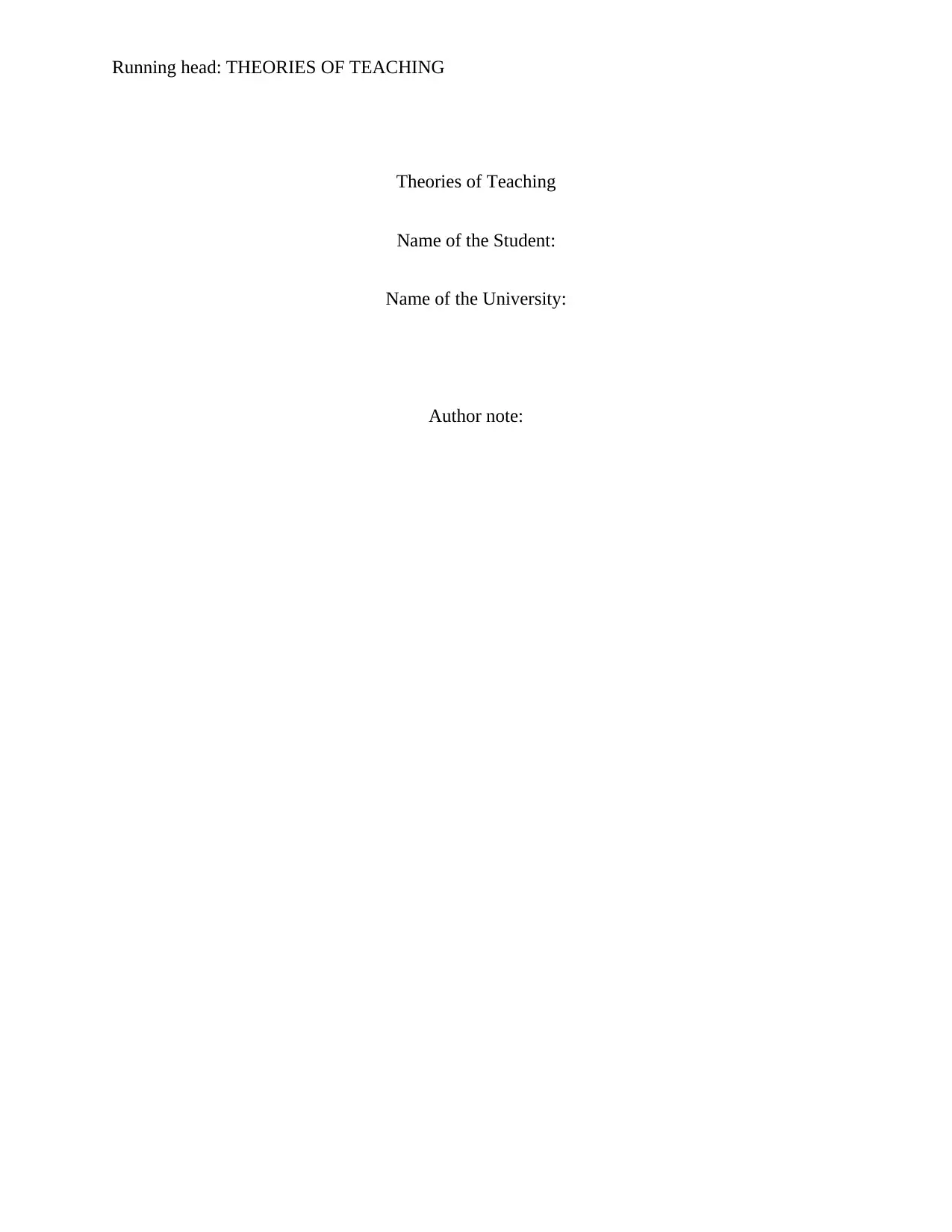
Running head: THEORIES OF TEACHING
Theories of Teaching
Name of the Student:
Name of the University:
Author note:
Theories of Teaching
Name of the Student:
Name of the University:
Author note:
Paraphrase This Document
Need a fresh take? Get an instant paraphrase of this document with our AI Paraphraser
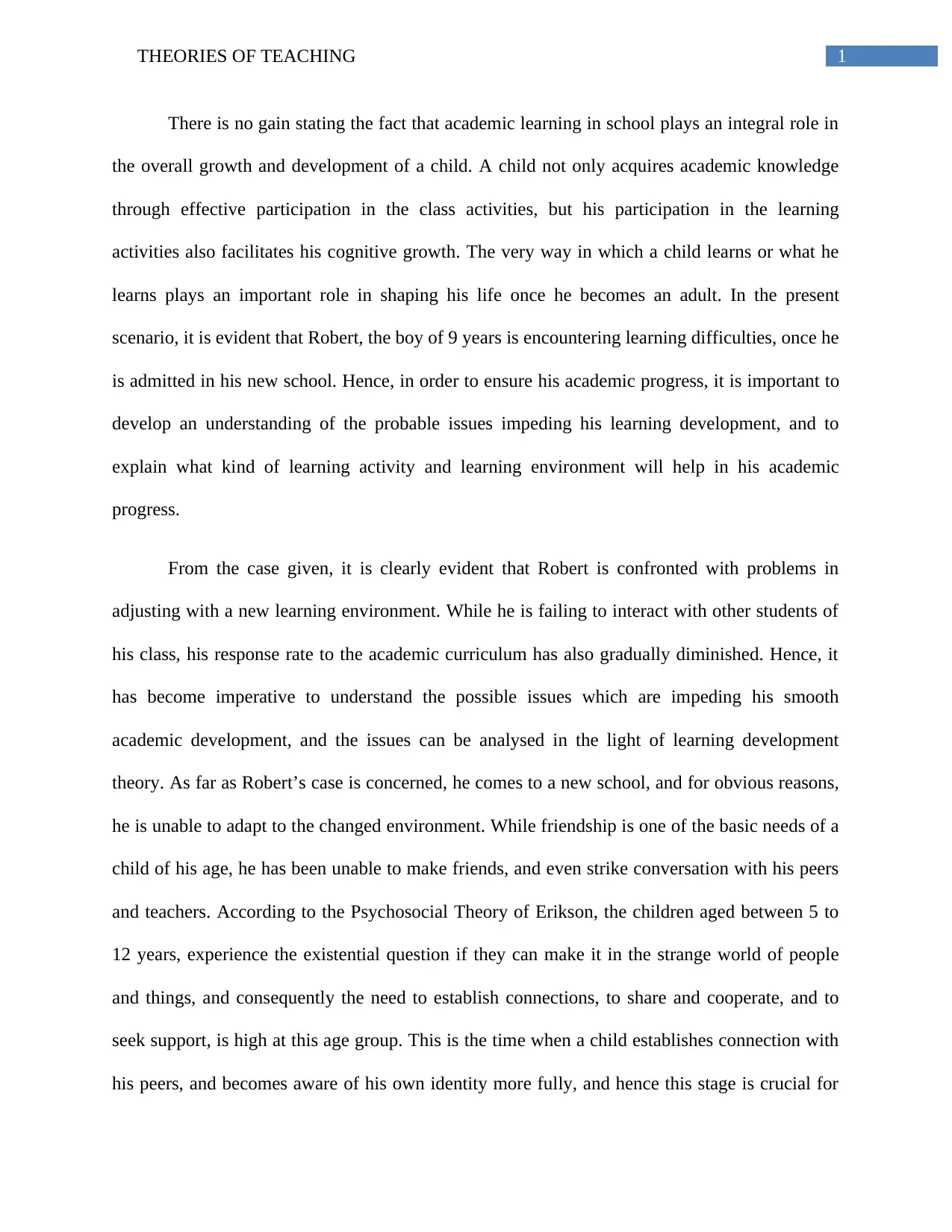
1THEORIES OF TEACHING
There is no gain stating the fact that academic learning in school plays an integral role in
the overall growth and development of a child. A child not only acquires academic knowledge
through effective participation in the class activities, but his participation in the learning
activities also facilitates his cognitive growth. The very way in which a child learns or what he
learns plays an important role in shaping his life once he becomes an adult. In the present
scenario, it is evident that Robert, the boy of 9 years is encountering learning difficulties, once he
is admitted in his new school. Hence, in order to ensure his academic progress, it is important to
develop an understanding of the probable issues impeding his learning development, and to
explain what kind of learning activity and learning environment will help in his academic
progress.
From the case given, it is clearly evident that Robert is confronted with problems in
adjusting with a new learning environment. While he is failing to interact with other students of
his class, his response rate to the academic curriculum has also gradually diminished. Hence, it
has become imperative to understand the possible issues which are impeding his smooth
academic development, and the issues can be analysed in the light of learning development
theory. As far as Robert’s case is concerned, he comes to a new school, and for obvious reasons,
he is unable to adapt to the changed environment. While friendship is one of the basic needs of a
child of his age, he has been unable to make friends, and even strike conversation with his peers
and teachers. According to the Psychosocial Theory of Erikson, the children aged between 5 to
12 years, experience the existential question if they can make it in the strange world of people
and things, and consequently the need to establish connections, to share and cooperate, and to
seek support, is high at this age group. This is the time when a child establishes connection with
his peers, and becomes aware of his own identity more fully, and hence this stage is crucial for
There is no gain stating the fact that academic learning in school plays an integral role in
the overall growth and development of a child. A child not only acquires academic knowledge
through effective participation in the class activities, but his participation in the learning
activities also facilitates his cognitive growth. The very way in which a child learns or what he
learns plays an important role in shaping his life once he becomes an adult. In the present
scenario, it is evident that Robert, the boy of 9 years is encountering learning difficulties, once he
is admitted in his new school. Hence, in order to ensure his academic progress, it is important to
develop an understanding of the probable issues impeding his learning development, and to
explain what kind of learning activity and learning environment will help in his academic
progress.
From the case given, it is clearly evident that Robert is confronted with problems in
adjusting with a new learning environment. While he is failing to interact with other students of
his class, his response rate to the academic curriculum has also gradually diminished. Hence, it
has become imperative to understand the possible issues which are impeding his smooth
academic development, and the issues can be analysed in the light of learning development
theory. As far as Robert’s case is concerned, he comes to a new school, and for obvious reasons,
he is unable to adapt to the changed environment. While friendship is one of the basic needs of a
child of his age, he has been unable to make friends, and even strike conversation with his peers
and teachers. According to the Psychosocial Theory of Erikson, the children aged between 5 to
12 years, experience the existential question if they can make it in the strange world of people
and things, and consequently the need to establish connections, to share and cooperate, and to
seek support, is high at this age group. This is the time when a child establishes connection with
his peers, and becomes aware of his own identity more fully, and hence this stage is crucial for
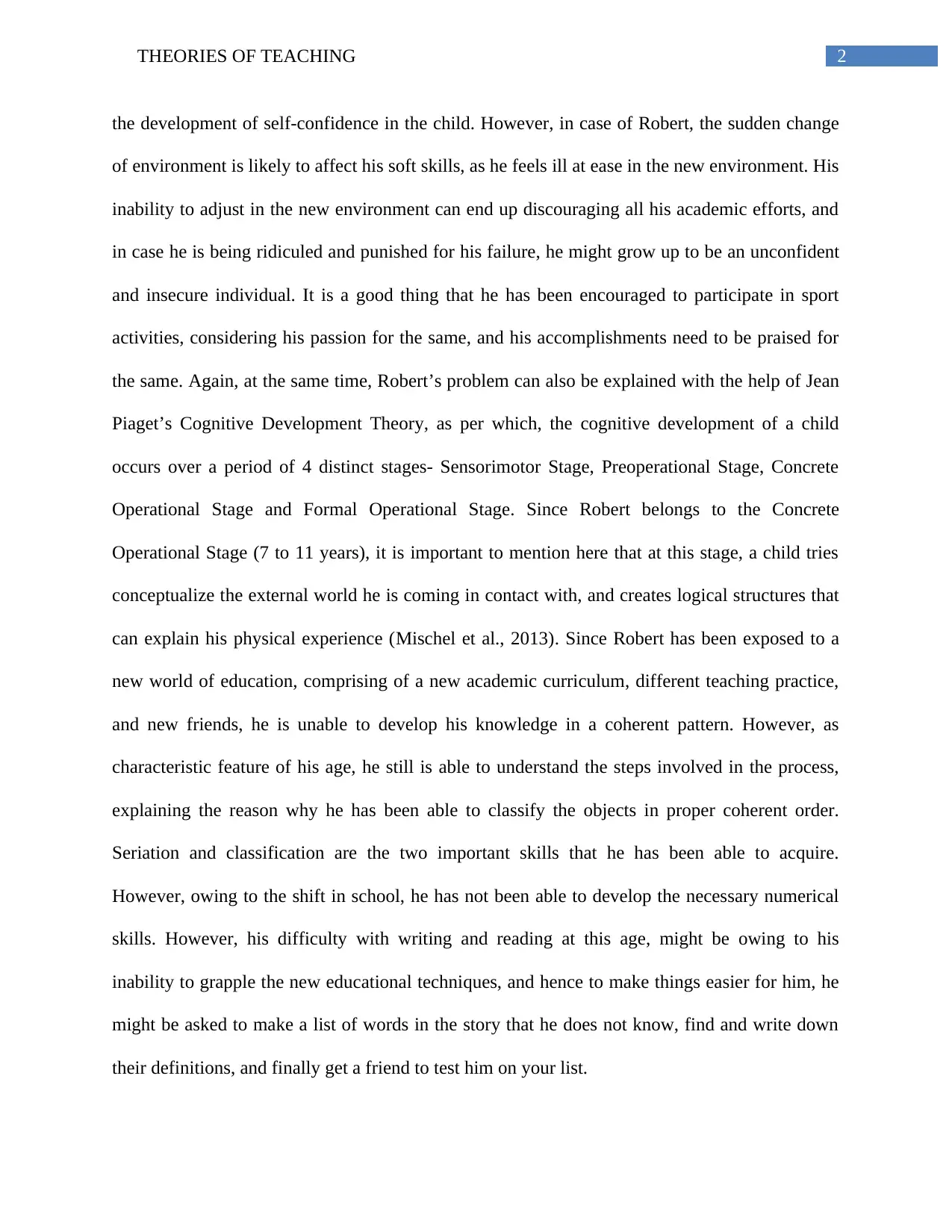
2THEORIES OF TEACHING
the development of self-confidence in the child. However, in case of Robert, the sudden change
of environment is likely to affect his soft skills, as he feels ill at ease in the new environment. His
inability to adjust in the new environment can end up discouraging all his academic efforts, and
in case he is being ridiculed and punished for his failure, he might grow up to be an unconfident
and insecure individual. It is a good thing that he has been encouraged to participate in sport
activities, considering his passion for the same, and his accomplishments need to be praised for
the same. Again, at the same time, Robert’s problem can also be explained with the help of Jean
Piaget’s Cognitive Development Theory, as per which, the cognitive development of a child
occurs over a period of 4 distinct stages- Sensorimotor Stage, Preoperational Stage, Concrete
Operational Stage and Formal Operational Stage. Since Robert belongs to the Concrete
Operational Stage (7 to 11 years), it is important to mention here that at this stage, a child tries
conceptualize the external world he is coming in contact with, and creates logical structures that
can explain his physical experience (Mischel et al., 2013). Since Robert has been exposed to a
new world of education, comprising of a new academic curriculum, different teaching practice,
and new friends, he is unable to develop his knowledge in a coherent pattern. However, as
characteristic feature of his age, he still is able to understand the steps involved in the process,
explaining the reason why he has been able to classify the objects in proper coherent order.
Seriation and classification are the two important skills that he has been able to acquire.
However, owing to the shift in school, he has not been able to develop the necessary numerical
skills. However, his difficulty with writing and reading at this age, might be owing to his
inability to grapple the new educational techniques, and hence to make things easier for him, he
might be asked to make a list of words in the story that he does not know, find and write down
their definitions, and finally get a friend to test him on your list.
the development of self-confidence in the child. However, in case of Robert, the sudden change
of environment is likely to affect his soft skills, as he feels ill at ease in the new environment. His
inability to adjust in the new environment can end up discouraging all his academic efforts, and
in case he is being ridiculed and punished for his failure, he might grow up to be an unconfident
and insecure individual. It is a good thing that he has been encouraged to participate in sport
activities, considering his passion for the same, and his accomplishments need to be praised for
the same. Again, at the same time, Robert’s problem can also be explained with the help of Jean
Piaget’s Cognitive Development Theory, as per which, the cognitive development of a child
occurs over a period of 4 distinct stages- Sensorimotor Stage, Preoperational Stage, Concrete
Operational Stage and Formal Operational Stage. Since Robert belongs to the Concrete
Operational Stage (7 to 11 years), it is important to mention here that at this stage, a child tries
conceptualize the external world he is coming in contact with, and creates logical structures that
can explain his physical experience (Mischel et al., 2013). Since Robert has been exposed to a
new world of education, comprising of a new academic curriculum, different teaching practice,
and new friends, he is unable to develop his knowledge in a coherent pattern. However, as
characteristic feature of his age, he still is able to understand the steps involved in the process,
explaining the reason why he has been able to classify the objects in proper coherent order.
Seriation and classification are the two important skills that he has been able to acquire.
However, owing to the shift in school, he has not been able to develop the necessary numerical
skills. However, his difficulty with writing and reading at this age, might be owing to his
inability to grapple the new educational techniques, and hence to make things easier for him, he
might be asked to make a list of words in the story that he does not know, find and write down
their definitions, and finally get a friend to test him on your list.
⊘ This is a preview!⊘
Do you want full access?
Subscribe today to unlock all pages.

Trusted by 1+ million students worldwide
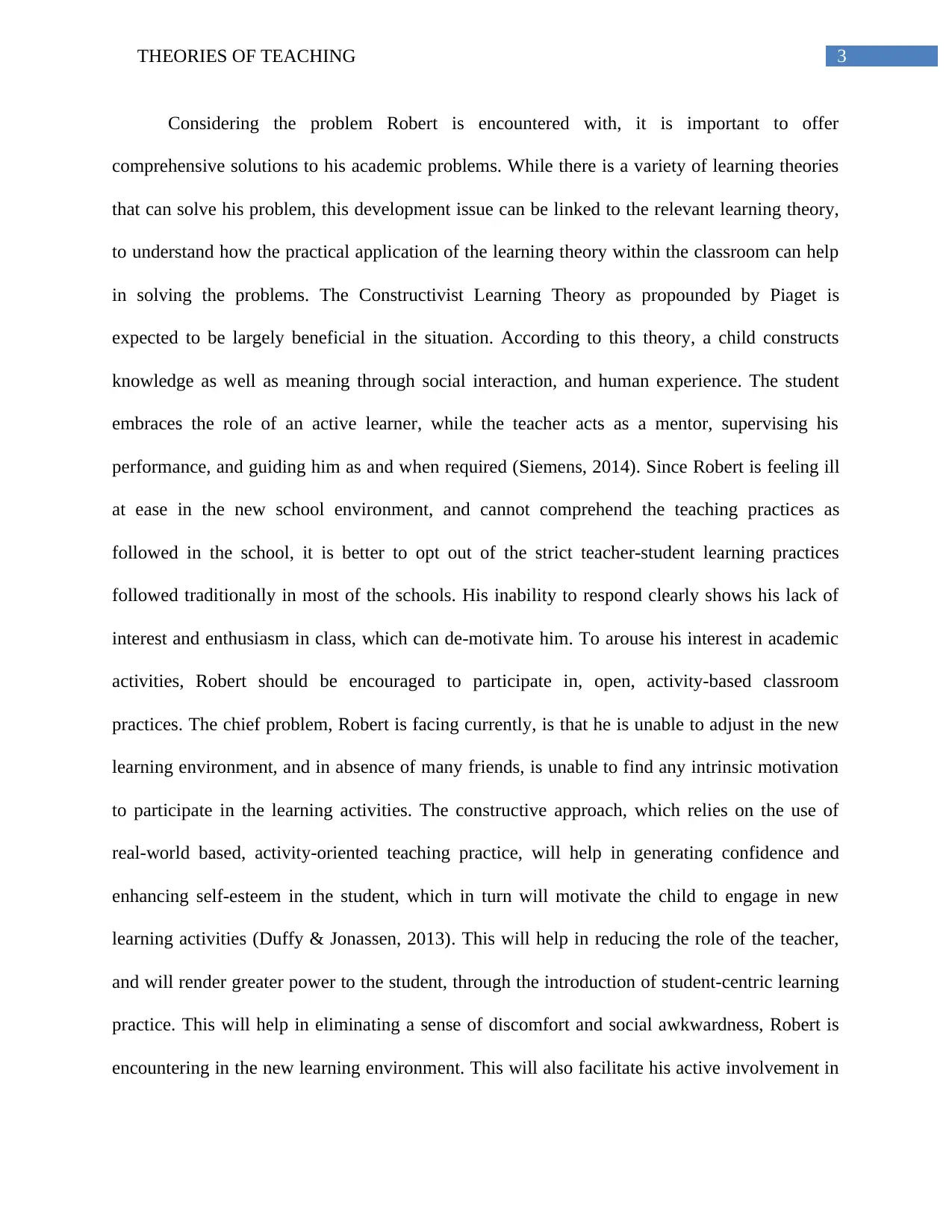
3THEORIES OF TEACHING
Considering the problem Robert is encountered with, it is important to offer
comprehensive solutions to his academic problems. While there is a variety of learning theories
that can solve his problem, this development issue can be linked to the relevant learning theory,
to understand how the practical application of the learning theory within the classroom can help
in solving the problems. The Constructivist Learning Theory as propounded by Piaget is
expected to be largely beneficial in the situation. According to this theory, a child constructs
knowledge as well as meaning through social interaction, and human experience. The student
embraces the role of an active learner, while the teacher acts as a mentor, supervising his
performance, and guiding him as and when required (Siemens, 2014). Since Robert is feeling ill
at ease in the new school environment, and cannot comprehend the teaching practices as
followed in the school, it is better to opt out of the strict teacher-student learning practices
followed traditionally in most of the schools. His inability to respond clearly shows his lack of
interest and enthusiasm in class, which can de-motivate him. To arouse his interest in academic
activities, Robert should be encouraged to participate in, open, activity-based classroom
practices. The chief problem, Robert is facing currently, is that he is unable to adjust in the new
learning environment, and in absence of many friends, is unable to find any intrinsic motivation
to participate in the learning activities. The constructive approach, which relies on the use of
real-world based, activity-oriented teaching practice, will help in generating confidence and
enhancing self-esteem in the student, which in turn will motivate the child to engage in new
learning activities (Duffy & Jonassen, 2013). This will help in reducing the role of the teacher,
and will render greater power to the student, through the introduction of student-centric learning
practice. This will help in eliminating a sense of discomfort and social awkwardness, Robert is
encountering in the new learning environment. This will also facilitate his active involvement in
Considering the problem Robert is encountered with, it is important to offer
comprehensive solutions to his academic problems. While there is a variety of learning theories
that can solve his problem, this development issue can be linked to the relevant learning theory,
to understand how the practical application of the learning theory within the classroom can help
in solving the problems. The Constructivist Learning Theory as propounded by Piaget is
expected to be largely beneficial in the situation. According to this theory, a child constructs
knowledge as well as meaning through social interaction, and human experience. The student
embraces the role of an active learner, while the teacher acts as a mentor, supervising his
performance, and guiding him as and when required (Siemens, 2014). Since Robert is feeling ill
at ease in the new school environment, and cannot comprehend the teaching practices as
followed in the school, it is better to opt out of the strict teacher-student learning practices
followed traditionally in most of the schools. His inability to respond clearly shows his lack of
interest and enthusiasm in class, which can de-motivate him. To arouse his interest in academic
activities, Robert should be encouraged to participate in, open, activity-based classroom
practices. The chief problem, Robert is facing currently, is that he is unable to adjust in the new
learning environment, and in absence of many friends, is unable to find any intrinsic motivation
to participate in the learning activities. The constructive approach, which relies on the use of
real-world based, activity-oriented teaching practice, will help in generating confidence and
enhancing self-esteem in the student, which in turn will motivate the child to engage in new
learning activities (Duffy & Jonassen, 2013). This will help in reducing the role of the teacher,
and will render greater power to the student, through the introduction of student-centric learning
practice. This will help in eliminating a sense of discomfort and social awkwardness, Robert is
encountering in the new learning environment. This will also facilitate his active involvement in
Paraphrase This Document
Need a fresh take? Get an instant paraphrase of this document with our AI Paraphraser
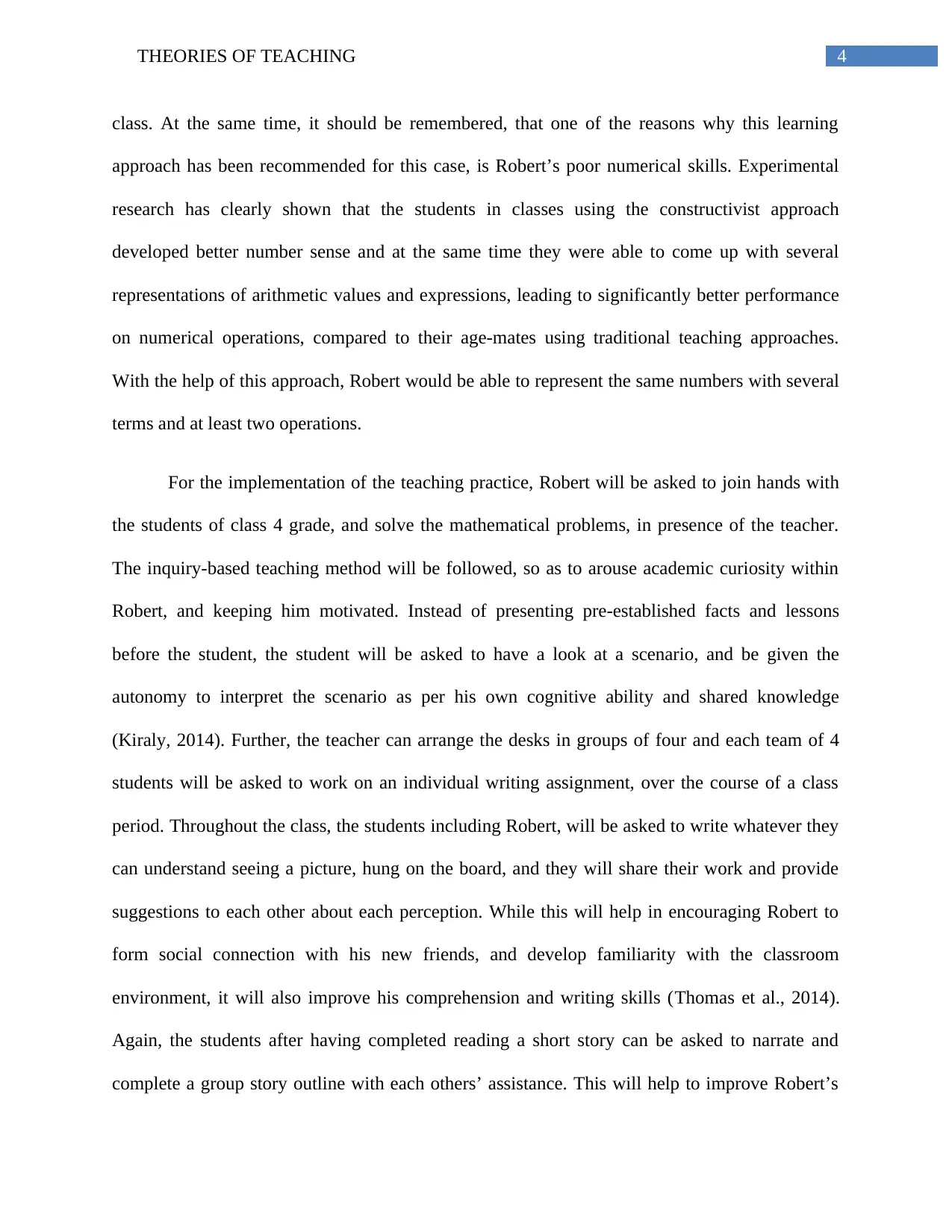
4THEORIES OF TEACHING
class. At the same time, it should be remembered, that one of the reasons why this learning
approach has been recommended for this case, is Robert’s poor numerical skills. Experimental
research has clearly shown that the students in classes using the constructivist approach
developed better number sense and at the same time they were able to come up with several
representations of arithmetic values and expressions, leading to significantly better performance
on numerical operations, compared to their age-mates using traditional teaching approaches.
With the help of this approach, Robert would be able to represent the same numbers with several
terms and at least two operations.
For the implementation of the teaching practice, Robert will be asked to join hands with
the students of class 4 grade, and solve the mathematical problems, in presence of the teacher.
The inquiry-based teaching method will be followed, so as to arouse academic curiosity within
Robert, and keeping him motivated. Instead of presenting pre-established facts and lessons
before the student, the student will be asked to have a look at a scenario, and be given the
autonomy to interpret the scenario as per his own cognitive ability and shared knowledge
(Kiraly, 2014). Further, the teacher can arrange the desks in groups of four and each team of 4
students will be asked to work on an individual writing assignment, over the course of a class
period. Throughout the class, the students including Robert, will be asked to write whatever they
can understand seeing a picture, hung on the board, and they will share their work and provide
suggestions to each other about each perception. While this will help in encouraging Robert to
form social connection with his new friends, and develop familiarity with the classroom
environment, it will also improve his comprehension and writing skills (Thomas et al., 2014).
Again, the students after having completed reading a short story can be asked to narrate and
complete a group story outline with each others’ assistance. This will help to improve Robert’s
class. At the same time, it should be remembered, that one of the reasons why this learning
approach has been recommended for this case, is Robert’s poor numerical skills. Experimental
research has clearly shown that the students in classes using the constructivist approach
developed better number sense and at the same time they were able to come up with several
representations of arithmetic values and expressions, leading to significantly better performance
on numerical operations, compared to their age-mates using traditional teaching approaches.
With the help of this approach, Robert would be able to represent the same numbers with several
terms and at least two operations.
For the implementation of the teaching practice, Robert will be asked to join hands with
the students of class 4 grade, and solve the mathematical problems, in presence of the teacher.
The inquiry-based teaching method will be followed, so as to arouse academic curiosity within
Robert, and keeping him motivated. Instead of presenting pre-established facts and lessons
before the student, the student will be asked to have a look at a scenario, and be given the
autonomy to interpret the scenario as per his own cognitive ability and shared knowledge
(Kiraly, 2014). Further, the teacher can arrange the desks in groups of four and each team of 4
students will be asked to work on an individual writing assignment, over the course of a class
period. Throughout the class, the students including Robert, will be asked to write whatever they
can understand seeing a picture, hung on the board, and they will share their work and provide
suggestions to each other about each perception. While this will help in encouraging Robert to
form social connection with his new friends, and develop familiarity with the classroom
environment, it will also improve his comprehension and writing skills (Thomas et al., 2014).
Again, the students after having completed reading a short story can be asked to narrate and
complete a group story outline with each others’ assistance. This will help to improve Robert’s
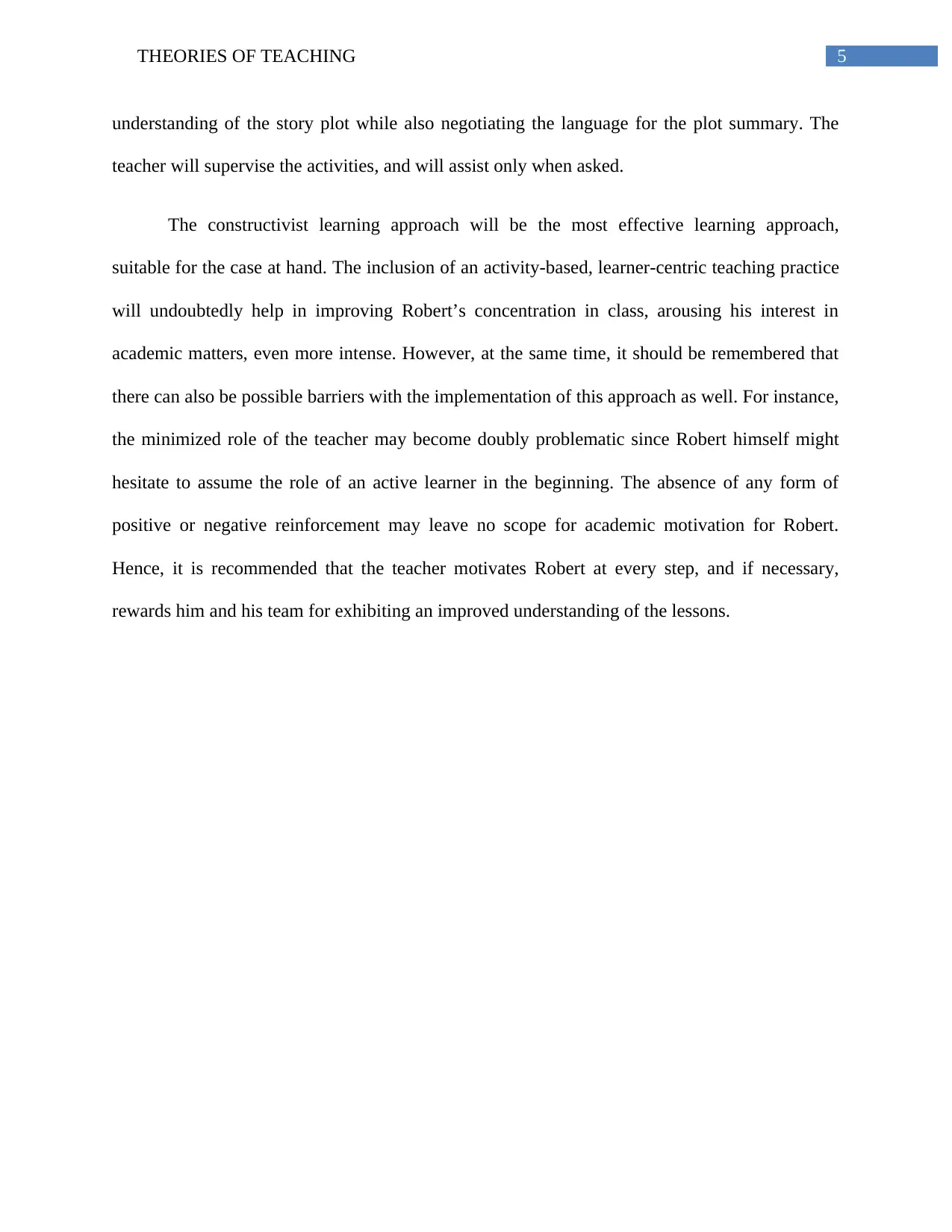
5THEORIES OF TEACHING
understanding of the story plot while also negotiating the language for the plot summary. The
teacher will supervise the activities, and will assist only when asked.
The constructivist learning approach will be the most effective learning approach,
suitable for the case at hand. The inclusion of an activity-based, learner-centric teaching practice
will undoubtedly help in improving Robert’s concentration in class, arousing his interest in
academic matters, even more intense. However, at the same time, it should be remembered that
there can also be possible barriers with the implementation of this approach as well. For instance,
the minimized role of the teacher may become doubly problematic since Robert himself might
hesitate to assume the role of an active learner in the beginning. The absence of any form of
positive or negative reinforcement may leave no scope for academic motivation for Robert.
Hence, it is recommended that the teacher motivates Robert at every step, and if necessary,
rewards him and his team for exhibiting an improved understanding of the lessons.
understanding of the story plot while also negotiating the language for the plot summary. The
teacher will supervise the activities, and will assist only when asked.
The constructivist learning approach will be the most effective learning approach,
suitable for the case at hand. The inclusion of an activity-based, learner-centric teaching practice
will undoubtedly help in improving Robert’s concentration in class, arousing his interest in
academic matters, even more intense. However, at the same time, it should be remembered that
there can also be possible barriers with the implementation of this approach as well. For instance,
the minimized role of the teacher may become doubly problematic since Robert himself might
hesitate to assume the role of an active learner in the beginning. The absence of any form of
positive or negative reinforcement may leave no scope for academic motivation for Robert.
Hence, it is recommended that the teacher motivates Robert at every step, and if necessary,
rewards him and his team for exhibiting an improved understanding of the lessons.
⊘ This is a preview!⊘
Do you want full access?
Subscribe today to unlock all pages.

Trusted by 1+ million students worldwide
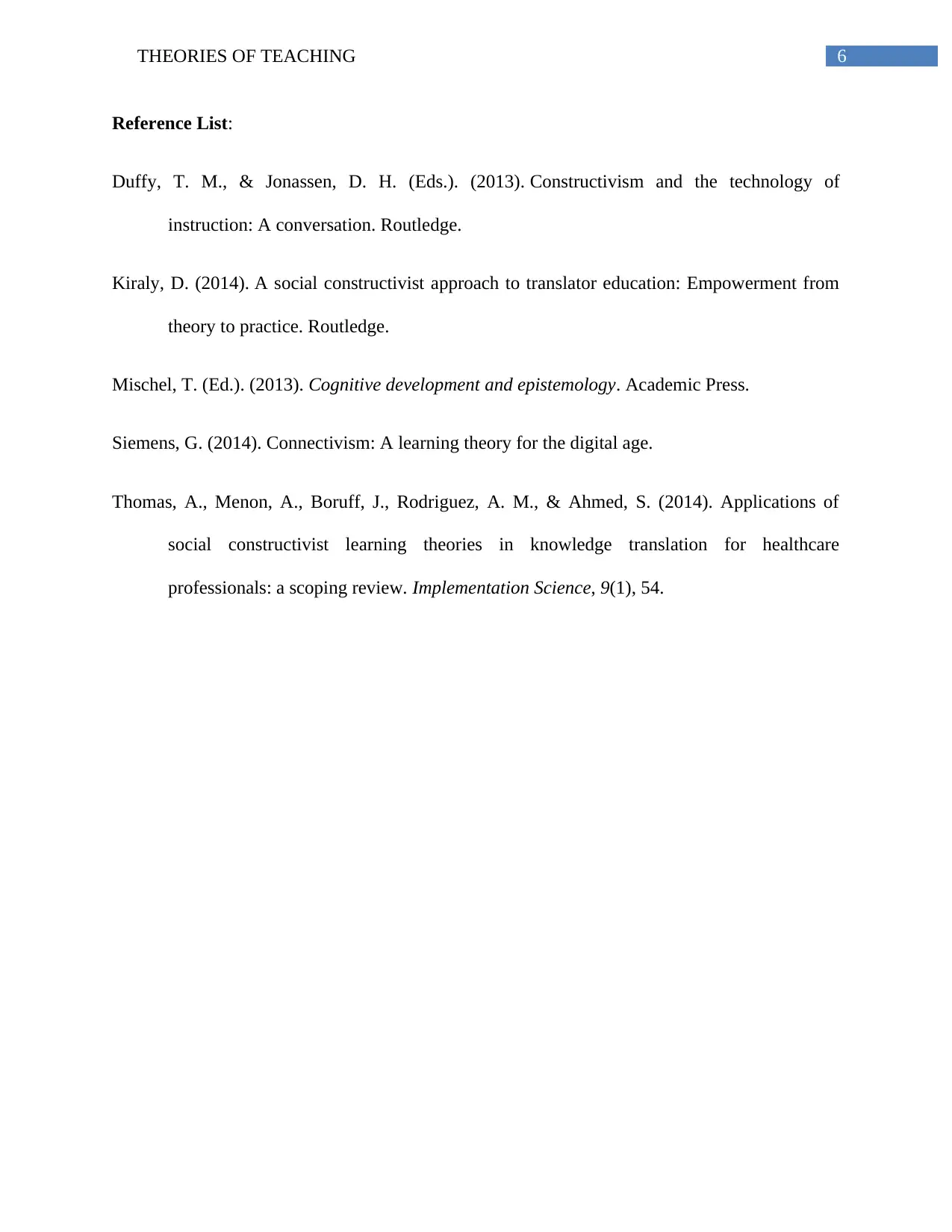
6THEORIES OF TEACHING
Reference List:
Duffy, T. M., & Jonassen, D. H. (Eds.). (2013). Constructivism and the technology of
instruction: A conversation. Routledge.
Kiraly, D. (2014). A social constructivist approach to translator education: Empowerment from
theory to practice. Routledge.
Mischel, T. (Ed.). (2013). Cognitive development and epistemology. Academic Press.
Siemens, G. (2014). Connectivism: A learning theory for the digital age.
Thomas, A., Menon, A., Boruff, J., Rodriguez, A. M., & Ahmed, S. (2014). Applications of
social constructivist learning theories in knowledge translation for healthcare
professionals: a scoping review. Implementation Science, 9(1), 54.
Reference List:
Duffy, T. M., & Jonassen, D. H. (Eds.). (2013). Constructivism and the technology of
instruction: A conversation. Routledge.
Kiraly, D. (2014). A social constructivist approach to translator education: Empowerment from
theory to practice. Routledge.
Mischel, T. (Ed.). (2013). Cognitive development and epistemology. Academic Press.
Siemens, G. (2014). Connectivism: A learning theory for the digital age.
Thomas, A., Menon, A., Boruff, J., Rodriguez, A. M., & Ahmed, S. (2014). Applications of
social constructivist learning theories in knowledge translation for healthcare
professionals: a scoping review. Implementation Science, 9(1), 54.
1 out of 7
Related Documents
Your All-in-One AI-Powered Toolkit for Academic Success.
+13062052269
info@desklib.com
Available 24*7 on WhatsApp / Email
![[object Object]](/_next/static/media/star-bottom.7253800d.svg)
Unlock your academic potential
Copyright © 2020–2026 A2Z Services. All Rights Reserved. Developed and managed by ZUCOL.





